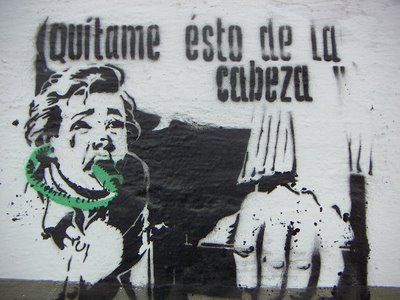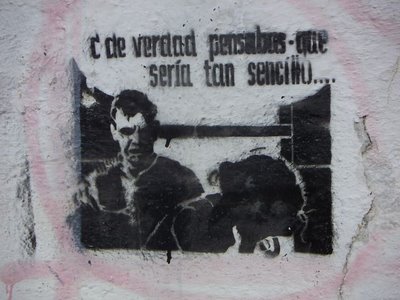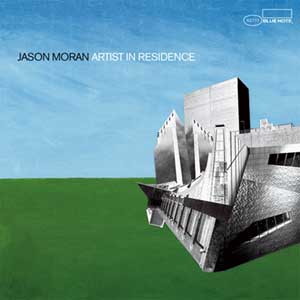Rudresh Mahanthappa - as (website | MySpace)
Chander Sardjoe - d
Ronan Guilfoyle - acoustic bass guitar
I first heard Rudresh Mahanthappa as sideman on a Belgian CD a few years ago. He stood out. I've also been following parts of Vijay Iyer's career (Fieldwork, mostly), so I've been aware of Mahanthappa for a while, but I'd yet to hear him live or on one of his own CDs. Then came Will Layman's article back in February (with the devastating quote: "The first time my name showed up in the Downbeat Critic's Poll, I couldn't afford to buy the magazine.").
The setting made a lot of sense: Chander Sardjoe is Indo-Dutch, has post-Steve Coleman tendancies and is an academic over-achiever. Lately, I've seen him several times with Octurn and he always brings a winning, human energy and a broad smile to often-complex music. Last night especially, Sardjoe's volcanic side was on full display. It's kind of like what Elvin Jones did to melt swing into a bubbling magma, only with a different starting point.
Ronan Guilfoyle is Irish.
Mahanthappa began the concert unaccompanied and instantly established a strong, arresting tone that had an Oriental keening but turned lusher on ballads. The other two joined in and quickly created a body-rocking swirl. Here, tone - or even individual notes - was less of a concern than the group's overall sound. One of the trio's characteristics is its constant intermingling of improvised and written material: amid furious rhythm topped with sheets of alto sound, a motif or unison passage will fleetingly appear, seemingly snatched out of thin air, or the group might shift directions, unexpectedly drop from high density to almost nothing, on a dime. It's power trio stuff, which only got more exciting as the intensity increased.
A few melodies pointed clearly to Indian roots, as did an occasional bass drone, and there's the attraction to complex rhythmic cycles, but, refreshingly, there was no overt fusion (or Fusion), no outsider view. Indeed, his jazz roots are treated much the same way. At a couple of points, it seemed to me that Mahanthappa was stringing together flayed quotes of standards, and the encore kind of sounded like the first couple of bars of "You And The Night And The Music," boiled down to very little.
The last song of the first set slid through a number of rhythmic feels, including the first appearance of straight swing. Listening to players born and raised on swing who then branch out, but continue to dip into it, is generally like snuggling up on an old favourite sofa. That wasn't the case here: it sounded quaint. The second set started out with a tune that explored walking bass swing more thoroughly and, though it wasn't quaint, it sounded less relaxed than the other stuff. Over a more regular, less involved base, Mahanthappa's soloing paradoxically seemed much more effortful, was dragged down rather than buoyed. I don't want to overstate the point or make it seem like some "Mahanthappa can't play straight jazz" diatribe, because it's not. In fact, the second set ended with a ballad perhaps intended to bring us down after a mostly high-octane evening. Here, the altoist's tone was delicate and breathy and his lines sweet. Then, via a bass solo, they launched into a burning sort of bastardised Headhunters, with Sardjoe dropping into a quasi-second line beat.
In a way, MSG's music was conceptually related to Mwandishi: applying a loose, jazz-oriented methodology to jazz-rock, but in MSG's case, minus the electricity and with mathematics that are both more complicated and more intuitive. A track title from Steve Lehman's Interface trio album captures the feel: "Structural Fire."
MSG is recording its first album this saturday. I picked up two CDs: Raw Materials, a duo with Vijay Iyer that has a very promising first track, and Codebook, Mahanthappa's latest quartet album. It comes with a disc that allows you to decipher a message written on the digipack's inside cover. I've cracked the first few words: "It is the."








